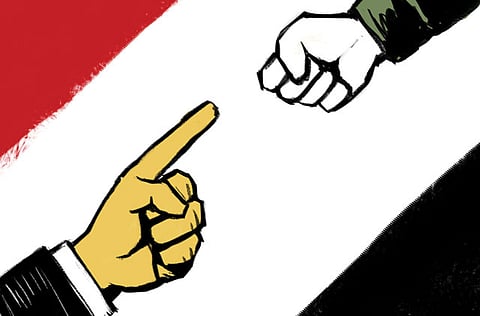The coming clash in Cairo: Mursi vs Military
Mursi’s swearing-in is certain to create new, unpredictable, political realities

Give Hosni Mubarak this much credit: He did always say that it was either him or the Muslim Brotherhood.
From Mubarak, of course, that was a warning. Now that it has actually come to pass, what it means is far less clear-cut. Because while Mohammad Mursi’s election is historic (an overused word in journalism but, in this case, surely appropriate), it does not alter the central reality of Egyptian life — the military runs the country and intends to continue making all of the decisions that count. The Muslim Brotherhood clearly believes it can change that. The coming clash between the two will do much to determine Egypt’s future.
Thanks to a series of decrees announced over the last two weeks, Mursi is set to take over a presidency stripped of most of its power. Parliament has been dissolved and the Supreme Council of the Armed Forces (Scaf) has declared itself to be the country’s sole legislative authority. Scaf has also appointed the assembly, charged with writing a new constitution while reserving the right to amend or veto whatever that assembly eventually produces. Needless to say it has exempted itself from any form of civilian oversight.
In the days between the presidential runoff and the confirmation of Mursi’s victory, one of Scaf’s advisers told a reporter that the new president would serve only briefly — several months at the most — and that new elections will be held once the new constitution is in place.
Taken together, that would seem to add up to an all-but-inevitable confrontation between the president-to-be and the generals.
Scaf’s election-week power-grab brought into stark relief the long-standing, larger truth about Egyptian life: The country has been under military rule for 60 years, not 16 months. Outsiders often miss this fact. Egyptians, on occasion, have wilfully ignored it. But if the country is to have any hope of a transition to real democracy, everyone must start by acknowledging that Egypt has been a military dictatorship not since Scaf pushed Mubarak aside last year, but since the Free Officers overthrew King Farouq in 1952.
It is important to understand and acknowledge this because doing so completely alters how we will all view the coming weeks and months.
The ouster of Mubarak by Scaf was not, as it is sometimes portrayed, the act of a group of apolitical outsiders stepping in to save the nation at a moment of civil upheaval. It was a case of the country’s real rulers saving themselves by sacrificing one of their own.
What is striking about this is that the Egyptian Army has been down this road before. After overthrowing the king, it ran the country overtly throughout the Nasser and, to a lesser extent, Sadat eras.
By the time Mubarak came to power, the military was already pulling back. Indeed, a decade or so ago, one of the virtues many outside observers saw in Mubarak was that he had eased soldiers out of day-to-day roles at many ministries, allowing technocrats to run significant portions of the government.
The Mubarak-era military was willing to let civilians take care of ministerial portfolios like electricity and agriculture, so long as the national security state kept control of the things that, from its perspective, really mattered — defence, interior, the security services and things that look civilian, but have too many security implications to be left in the hands of actual civilians (hence Ahmad Shafiq’s decade-plus stint as minister of civil aviation).
Mubarak personified this trend. Western journalists interviewing him in the 80s and 90s often had it pointed out to them that in the week between Anwar Sadat’s death and his formal assumption of the presidency, Mubarak officially resigned from the air force and was never seen in uniform again.
This was presented as an important symbol of civilian control, but always glossed over the fact that from the Egyptian military’s perspective, it did not matter what kind of clothes Mubarak wore — the soldiers always recognised him as one of their own. When his cabinet met, business suits far outnumbered uniforms, but that did not really matter because the men in uniforms knew that, ultimately, they were still in charge.
That remains the case for now. But Mursi’s swearing-in is certain to create new and unpredictable political realities. He may not have a lot of formal power, but as an elected leader — the first one in the country’s 5,000-year history — he will command a type of legitimacy the generals cannot.
People tend to assume that whatever is happening now will go on happening. Scaf surely believes that the military, which it embodies, will rule Egypt for the foreseeable future, just as it has done for the last 60 years. The Muslim Brotherhood, having gone from strength to strength since Mubarak’s departure, no doubt believes that its present winning streak will continue indefinitely. One thing seems certain: They cannot both be right.
Gordon Robison, a long-time Middle East journalist and US political analyst, teaches political science at the University of Vermont.


